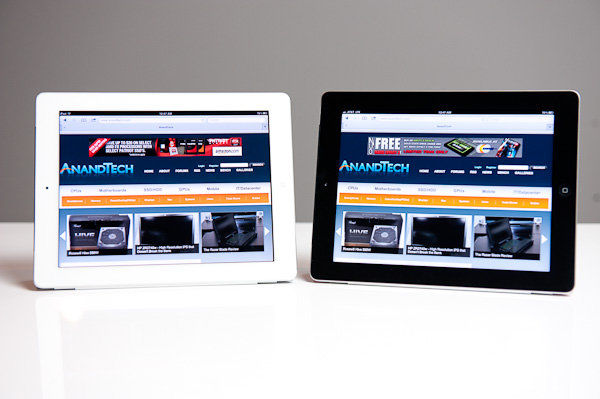The Apple iPad Review (2012)
by Vivek Gowri & Anand Lal Shimpi on March 28, 2012 3:14 PM ESTSince Apple launched the first iPad two years ago, the tablet market has evolved rapidly. While slate tablets were nothing new, the original iPad was the first serious tablet to be built around smartphone components and a user interface designed specifically for touchscreen input. The hardware was enough to run the OS smoothly while maintaining good battery life, the thin and light form factor lent itself to easy portability, and the touch-based user experience was miles better than earlier devices based on desktop operating systems.
We take it for granted now, but this was all news back in 2010, and the iPad was practically in a category of its own, with no real competitors to speak of. After Apple started shipping the iPad, the segment basically exploded—we had Google jump in with Honeycomb, HP got into it (and then out of it) with webOS, RIM had a go with the PlayBook, Amazon pushed the Kindle line into the tablet space, and Microsoft created its next release of Windows with tablets in mind. Along the way, Apple updated the iPad, both on the software side with multitasking, a new notifications system, and a myriad of UI updates, as well as launching second generation iPad hardware. The iPad 2 was a comprehensive update, bringing a dual core processor, unrivaled graphics performance, cameras fore and aft, and a ground up redesign that brought a thinner and lighter form factor.
The iPad 2 was a significant improvement over the original—faster, more portable, and generally a far more polished device. Not that it was perfect: iOS 4 still had issues with smooth multitasking and an archaic notifications system, the cameras were mediocre, and the XGA display, while a great quality panel, didn’t have the kind of pixel density expected of a premium mobile device. The iPad 2 hit market around the same time as Honeycomb (in Motorola’s Xoom) early last year, and at first Apple still held a major edge in terms of hardware. As more impressive Honeycomb devices like Samsung’s Galaxy Tab 10.1 and the ASUS Transformer Prime were launched, along with Ice Cream Sandwich looming on the horizon, Android became a much more viable tablet alternative to iOS. And with Microsoft planning for a major push later this year for ARM-based Windows 8 tablets centered around the Metro UI, Apple has never faced such stiff competition in the tablet space. Which brings us to the third generation of iPad hardware.
It has a display resolution that dwarfs most high-end desktop displays. The panel also puts a real emphasis on quality, not just resolution. For a computing device targeted squarely at the consumer market, both of these things are rarities.
Its SoC is the absolute largest ever squeezed into an ARM based tablet. The chip itself is even bigger than what you find in most mainstream notebooks. It’s expensive, it puts out a ton of heat and it offers a tremendous GPU performance advantage over anything else in its class.
And it has a battery that’s larger than what ships in the current crop of similarly sized ultraportables and Ultrabooks.
The new iPad doesn’t significantly change the tablet usage paradigm, but it does put all previous attempts at building hardware in this space to shame. It’s the sort of no holds barred, performance at any expense design that we’re used to seeing from enthusiast PC component vendors—but in a tablet...from Apple.
Welcome to the new iPad.












234 Comments
View All Comments
mr_ripley - Friday, March 30, 2012 - link
It's a shame some people argue that against the workers when over a hundred of them have committed suicide over the working conditions. How can you still say that they are being offers a better deal here??On the other hand, it is also unfair that Apple is being singled out here. The world of Chinese manufacturing is a dirty one and all major corporations have a part in it. I'd trust Apple over most other companies to make a difference in that regard, and I'm happy to see something is being done in that regard. Ever heard McDonalds CEO touring the slaughterhouse of the meat packing companies??
name99 - Friday, March 30, 2012 - link
Reporting suicides as a number not as a rate shows you to be either a fool or a deliberate liar. How many people, over how many years, comprise the pool from which this suicide number is drawn? Everything I have read says that the actual suicide rate is not only lower than the average rate for China, it is lower than the average rate for the US.mr_ripley - Friday, March 30, 2012 - link
In 2010, 18 workers attempted sucide, 14 succeeded. To me even one in a whole year is not acceptable. If you think that is ok I hope that statistic turns out to be you!!name99 - Saturday, March 31, 2012 - link
The argument was NOT that suicide is a tragedy, it was a claim that FoxConn employees specifically tied to Apple production have such lousy lives that they commit suicide in higher numbers that other people around the world.You have done NOTHING to prove this claim; all you have done is bring up a very different issue.
mr_ripley - Saturday, March 31, 2012 - link
There is no disputing the fact that these deths are related to working conditions. I'm pretty sure this has been well established and documented. However, I did say in my previous post that Apple is unfairly singled out. It could have been any other company.Comparison between suicide rates is irrelevant. Higher sucide rates elsewhere does not justify this problem. Again the fact remains that many people have died and it is directly related to the working conditions.
Apple happens to be in a position to directly influence their lives and make it better, after all they profit in billions from the work these people do. Corporations typically place little value over human life and living conditions (IBM sold equipment to the Nazis to track the Jews in concentration camps). Somehow, I feel Apple is different.
doobydoo - Sunday, April 1, 2012 - link
Dude, sorry but you're talking no sense at all.First of all, pretty much any product you want to buy, electronics wise, uses parts from China where conditions are far worse on average, than Apples factories. So if you actually factored working conditions into the product review, it would look favourable for Apple.
Secondly, your argument that comparison between suicide rates is irrelevant, is absurd. Higher suicide rates where legislation is such that no jobs suffer such terrible conditions that suicide is the only option, such as is the case here, prove that even if working conditions are refined, you still get some depressed people. Your argument, therefore, is with the people who committed suicide. You say it is 'directly related to the working conditions' but where have you evidenced this, at all? You simply haven't. The fact that the suicide rates at Apple factories are lower than some American ones further backs up my point on this.
Every company is in a position to change lives and make them better. You too, are in a position to do this. But guess what. You, just like companies, can do WHATEVER YOU LIKE with your OWN MONEY and have NO OBLIGATION WHATSOEVER to solve the worlds problems. Apple already has amongst the best conditions of factories in China. The amount of profit they make is absolutely irrelevant, if you say Apple should be putting money into this then a lot more manufacturers should also put a lot more money into this. It's very easy to decide what other people 'should' do with their money now, isn't it?
Corporations don't have to adhere to moral values - they are not people. They are there solely to make money. Nothing else. Don't confuse them with people. And I hope you donate every single spare penny to charity and spend every spare second of your time working to build homes in the 3rd world. Oh wait, you're on here crying that other people should do it instead.
Get a hold of yourself you illogical fool.
mr_ripley - Sunday, April 1, 2012 - link
Like I have said before it is a shame some people argue with great zeal against others who are suffering and devalue human life. Fortunately, Tim Cook is not one of them.If scores of people killing themselves citing poor working conditions is not enough proof what is? If your claim that there are work environments in America that have higher suicide rates because of working conditions is true that needs to be investigated as well and rectified.
You give charity to people who are in need and cannot earn for themselves. If you think giving someone fair amount of compensation for hard work is charity you are delusional.
If working in those factories is such a pleasent experience I suggest you try it out for yourself. Maybe the experience might broaden your perspective.
Although, I don't see the point I will attempt to educate you. Legally, a corporation is considered as a person, that is right just like a live human being. Regardless of that corporations are run by people and actions of a corporation reflect upon the morality of the people running them.
I will stop here as there is no point in continuing but you can respond with more insults and accusations of what I do or have done which frankly is no concern of yours.
PeteH - Monday, April 2, 2012 - link
I've not seen a single report of people killing themselves and citing "poor working conditions" as the reason. Can you provide a link?There have been reports of people killed because of unsafe working conditions, but that's a different issue. Maybe you're confusing the two.
mr_ripley - Tuesday, April 3, 2012 - link
Here's a Wikipedia link: you can read some of the circumstances and judge for yourself.They may not have said it in so many words but it is clear they were unhappy with ther work environment.
Imagine your boss coming and beating you up because you lost an iPhone prototype!!!
mr_ripley - Tuesday, April 3, 2012 - link
http://en.wikipedia.org/wiki/Foxconn_suicides